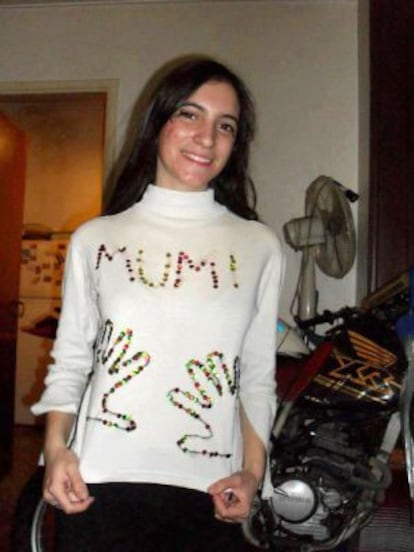A young girl’s murder reignites Argentina’s debate on crime
Death of Ángeles Rawson joins list of cases where violence sparked political reactions


Ángeles Rawson was 16 years old and she lived in the Buenos Aires sector of Palermo. This middle-class student recently received honors for her high grades in high school.
On Monday, Ángeles left her school gym class, telling a friend that she was going home to eat but would soon return. She was never seen alive again.
At about 9.15pm her mother Jimena Aduriz called her on her cellphone but Ángeles didn’t answer. About a half hour later she called again but this time someone switched off the phone.
The following morning, Jimena put the word out on the internet’s social networks that her daughter was missing. “Please, my daughter Ángeles Mumi Rawson has been missing since yesterday […] I am asking everyone to please circulate this photograph.”
The search was brief: the body of Ángeles was found at around 11.30am Tuesday morning at a waste treatment center wrapped inside a trash bag; a rope had been tied around her neck and legs. An autopsy revealed that she had been strangled but not raped as initially believed.
The tragic incident has captured headlines around the country and reignited debates about the growing crime problems facing Argentina. It is an issue that is certainly going to have a major impact in the upcoming electoral campaign as Argentineans go to the polls in August primaries and again in October to elect members of Congress.
We deserve a country where there are no more victims like Ángeles"
“We deserve a country where there are no more victims like Ángeles,” said the girl’s grandmother, María Inés, who went before television cameras on Tuesday night. “I am asking you, please, to react.”
The following day, Franklin Rawson, the victim’s father, made an appeal to the country’s voters “to remember all what has happened” when they go to the polls. “There is no bringing her back, but what I am demanding is justice and asking that this crime be stopped. We cannot go one living like this,” said the divorced father on radio.
Hours later, Jimena Aduriz also appeared before the cameras but refrained from criticizing politicians or the judicial system. “I am at peace; I trust the justice system.”
Later that night, with a camera crew in tow, the police executed a search warrant at the girl’s home where she lived with her mother, brothers and her mother’s husband. The TV cameras captured the moment when they carried out the dead girl’s computer and other items.
Crime and high inflation are the two biggest concerns among Argentineans, according to polls. The opposition blames the government of Cristina Fernández de Kirchner for the rampant crime problem while the president blames the judicial system.
“Law enforcement authorities become frustrated after they spend days investigating a case to apprehend an individual only to see him released by the judges for whatever reason,” President Fernández de Kirchner said in December 2010.
The Ángeles tragedy isn’t the only case that has sparked outrage among society while shaking the political arena. The search for Marita Verón, who went missing in 2002, has reinforced Fernández de Kirchner’s criticisms of the justice system. Marita’s mother, Susana Trimarco, has undertaken a desperate public search for her daughter who she believes was the victim of a sex-trafficking organization led by a prominent citizen.
But the case took a dramatic turn when, after a 10-month trial, a court in Tucumán province acquitted 13 people who had been charged in connection with Marita’s disappearance. When she learned about the acquittals, the president immediately called Trimarco to offer her support.
In another high-profile investigation – the murder of Candela Sol Rodríguez – the government has been at receiving end of criticism, however. Candela was an 11-year-old girl from Buenos Aires whose body was found in August 2011, some 10 days after she was kidnapped. After hundreds of news reports and demonstrations by citizens, the case is still shrouded in mystery.
Tu suscripción se está usando en otro dispositivo
¿Quieres añadir otro usuario a tu suscripción?
Si continúas leyendo en este dispositivo, no se podrá leer en el otro.
FlechaTu suscripción se está usando en otro dispositivo y solo puedes acceder a EL PAÍS desde un dispositivo a la vez.
Si quieres compartir tu cuenta, cambia tu suscripción a la modalidad Premium, así podrás añadir otro usuario. Cada uno accederá con su propia cuenta de email, lo que os permitirá personalizar vuestra experiencia en EL PAÍS.
¿Tienes una suscripción de empresa? Accede aquí para contratar más cuentas.
En el caso de no saber quién está usando tu cuenta, te recomendamos cambiar tu contraseña aquí.
Si decides continuar compartiendo tu cuenta, este mensaje se mostrará en tu dispositivo y en el de la otra persona que está usando tu cuenta de forma indefinida, afectando a tu experiencia de lectura. Puedes consultar aquí los términos y condiciones de la suscripción digital.








































